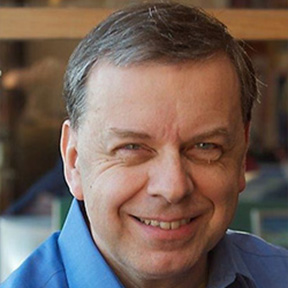Former Editor-in-Chief of Nature: Research Should Focus on Areas Where Hungary Already Excels
"One country cannot compete in every area – the most important thing is to concentrate on its own strengths," believes Sir Philip Campbell.
Sir Philip Campbell, who served as the Editor-in-Chief of Nature, one of the most prestigious scientific journals, from 1995 to 2018, was elected a Fellow of the Royal Society in 2024. He has been assisting the Hungarian Research Network (HUN-REN) for over a year, first as a member of the Presidential Circle and now on the Scientific Advisory Board. During his visit to Hungary, we spoke with Sir Philip about Europe's competitiveness in research, why it's necessary to focus research and innovation efforts rather than compete across all areas, the need for a more unified structure in research networks, and why it is critical for HUN-REN to communicate its outstanding results in an accessible way to the public.

The HUN-REN Hungarian Research Network was established in 2019 with the goal of serving as one of the cornerstones of Hungarian scientific life and operating as an independent research network. It encompasses eleven research centers, seven research institutes, and 116 research groups that conduct research in various scientific fields, from natural sciences to social sciences, supporting the entire value chain. The goal of HUN-REN is to make research more effective and successful while preserving research freedom, alongside public funding. Additionally, it supports the practical utilization of research results, enhancing the competitiveness of the Hungarian economy, as well as international research and innovation collaborations.
– How do you see the competitiveness of Europe, and Hungary in particular, in the global race for innovation and research?
I see that Europe – and Hungary within it – needs to do more to promote innovation: investments must be encouraged, research-based developments in companies must be supported, and innovative spin-off companies originating from universities and research institutes must be fostered. Many different approaches have been tried worldwide in this area, and some have already been analyzed, including the most successful ones. I believe that Europe, and especially Hungary, has a significant role to play in this positive change. At the same time, we all know that the massive investments in renewable energy occurring in China are difficult to surpass anywhere. Furthermore, the United States’ culture of innovation, fueled by competitiveness, is also hard to replicate. However, the real strength lies in collaboration. I refer to the fact that Hungarian researchers are already actively collaborating at both European and global levels because they excel at what they do, and others would like to involve them in their networks. The more Hungary can do in this area, both scientifically and socially, the more successful it can be in the future.
Sir Philip Campbell has spent much of his PhD career editing scientific journals. He conducted his postdoctoral research at the University of Leicester in the field of upper-atmospheric physics and then became the physical sciences editor for Nature. Later, he worked as the founding editor of Physics World at the Institute of Physics.
In 1995, he was appointed Editor-in-Chief of Nature, and in 2018 he became the Editor-in-Chief of Springer Nature, which is responsible for publishing numerous scientific books and journals. In 2023, he retired from the world of scientific publishing but continues to work as a consultant in the field of research.
At Nature, he was particularly responsible for editorial content and for new multidisciplinary journals that published research directly addressing social challenges. He has also been a committed supporter of scientific mentoring and good lab management. For his scientific contributions, he was knighted in 2015 and received a lifetime achievement award from the British Science Writers’ Association in 2019. In 2024, he was elected a member of the Royal Society.
– How can a country the size of Hungary compete with the largest countries in research and innovation?
I believe it is not worth striving to compete with the largest countries unless we break down the question into Hungary’s unique strengths, of which there are many. One such strength is the country’s geographical location, which can be particularly important in understanding climate change. Generally speaking – and my experiences with HUN-REN over the past year or two confirm this – Hungary has immense research talent. Hungary’s research culture has a history spanning over a century, but this potential is not sufficiently expressed, either within Hungary or internationally. In my opinion, here lies the key: we must focus on the areas where Hungary is already outstanding and designate research missions that can further strengthen the country. There is no need to compete in every field – it is enough for the country to build on its own strengths and focus on them.
– How did you get involved with HUN-REN? In your view, which scientific fields does HUN-REN excel in?
It happened that I already knew Balázs Gulyás, the President of HUN-REN, before he joined the organization. I met him several times in Singapore, and he thought that, based on my experience as Editor-in-Chief of Nature, I could be useful as a consultant.
I first participated in the group he called the “President’s Circle,” and today was my first meeting as a member of the International Advisory Board. Over the past year, I also participated in the international evaluation of the HUN-REN research institutes, so I have gained insight into the strengths and challenges of the research institute network in various areas.
As for the scientific fields, HUN-REN is strong in several areas. I would mention Astronomy as an example.
Although I did not evaluate every institute, only a few, it is clear that there are significant national-level projects in the humanities and social sciences that are essential for understanding Hungarian society. Their international presence depends on whether other social scientists see the solved problems as relevant. But if something is truly important for Hungary, then that alone constitutes excellence. If it is also significant internationally, that is even better.
The emphasis is on the social impact of the research, whether those impacts are significant just in Hungary or on a broader scale – in Europe, or globally.
– Where do you see areas for development? What are the biggest challenges within the research institute network?
Encouraging researchers is extremely important, and this applies to every scientifically active country. This perspective is changing worldwide because everyone recognizes the significance of curiosity. People appreciate Astronomy, for example, even though it does not provide immediate solutions to everyday problems. At the same time, governments are increasingly focusing on ensuring that research provides direct answers to social challenges.
Therefore, it is crucial how we assess and encourage researchers to respond better to these challenges.
Additionally, as I mentioned earlier, HUN-REN must improve its communication and presence both in the Hungarian public and on the international stage, as it has vast resources. These are key issues for the network’s future success.
(Source: mandiner.hu
Translation: hun-ren.hu)

